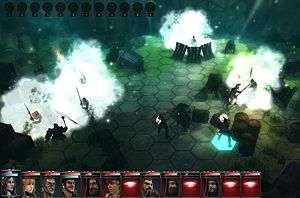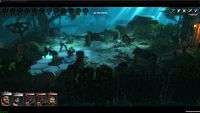Blackguards – Preview
by Adam B
|
 Blackguards is a new game from Daedalic Entertainment, who are known for their adventure games, their adventure games and their adventure games; Blackguards is not an adventure game, however, it is a turn-based strategy RPG and I recently had the chance to play through its first act.
Blackguards is a new game from Daedalic Entertainment, who are known for their adventure games, their adventure games and their adventure games; Blackguards is not an adventure game, however, it is a turn-based strategy RPG and I recently had the chance to play through its first act.
The premise is a simple one: you are a Warrior/Mage/Rogue (delete as applicable) imprisoned for a murder that you may or may not have committed trying to find out ‘whodunnit’ and why everyone seems so obsessed with finding out what The Name is, while fleeing from justice. Joining you on your quest are such fantasy clichés as an angry dwarven warrior, an elf who’s good with a bow, and a mage/sex-pest, all of whom have also committed a variety of crimes and thus provide a constant stream of people wanting to beat you, arrest you, or arrest and beat you.
The main story is told through a combination of interactive cutscenes and conversations with NPCs that you encounter. So far it appears to be very linear and while there are occasional dialogue choices – by which I mean those with meaningful effects rather than simply choosing which order to to run through your lines – often your only real choices are whether or not to take on sidequests. This isn’t inherently a problem and the story and dialogue are well written, but if you’re the kind of person who really likes to roleplay their characters you’re going to be out of luck here.
As you travel from place to place on the world map you will find yourself either in a town or village where you can click on NPCs to chat, shop, heal and the like or, more often than not, enter into combat. Said combat occurs on a hex-grid battlefield and is turn-based with turn order being determined by a character’s initiative. In a very similar vein to the recent XCOM game, each turn has a movement and an action phase with the option to move twice as far by forfeiting your action. Unlike XCOM, you have much more control over the exact path your character will take across the battlefield, which is essential given the risk of attacks of opportunity should you pass too close to an enemy and the environmental hazards that are present on many of the maps.
 The game encourages you to make use of the environment as much as possible, both in terms of luring enemies into hazards and using cover to protect yourself from ranged attacks, however, I found that the perspective often makes it hard to tell whether or not you are behind cover with regard to a given attacker as there isn’t an obvious “in cover” indicator. That said, when you can pull it off there is something very satisfying about toppling crates onto someone or igniting a pocket of swamp gas and setting everyone on fire. Everyone, incidentally, includes your own units as there is friendly fire for anything that affects more than a single hex.
The game encourages you to make use of the environment as much as possible, both in terms of luring enemies into hazards and using cover to protect yourself from ranged attacks, however, I found that the perspective often makes it hard to tell whether or not you are behind cover with regard to a given attacker as there isn’t an obvious “in cover” indicator. That said, when you can pull it off there is something very satisfying about toppling crates onto someone or igniting a pocket of swamp gas and setting everyone on fire. Everyone, incidentally, includes your own units as there is friendly fire for anything that affects more than a single hex.
Blackguards is based on The Dark Eye pen-and-paper RPG ruleset and it adheres closely to it, sometimes to its detriment in my experience. Pen-and-paper RPGs work on the premise that you have a human GM (Games Master) who can react to players’ actions and can step in to stop bad rolls (or bad players) from ruining a game; nobody wants the first roll of the game to critically fail and kill the entire party in a hellish fireball (well, maybe once, just for laughs). Computers lack this ability and so it’s quite possible for a fight that you should be and are easily winning to suddenly turn into a catastrophic failure as your party have a string of failed saving rolls, missed attacks and fizzled spells. On one occasion I was trying to revive a downed party member (which must be done within three turns or they are out of commission until the end of the fight) and my one healer failed an 82%-success-chance healing spell three times in a row. This kind of thing can become frustrating very quickly when your success seems to be determined more by the RNG than by anything you have control over.
 |
 |
 |
 |
 |
 |
The combat itself varies from strategic to chaotic depending on your objective; when it’s simply to kill everything in the room you can sit back, plan carefully, and systematically work your way through your foes. When you’re given a turn limit or other variables (such as crystals that heal your enemies every turn until destroyed) you’re forced to take a much riskier approach, charging across the battlefield rather than hugging every piece of cover you can find. It’s a nice way to break up the combat and stop the fights from becoming too repetitive, although they do reuse the same set-pieces a number of times during the first act meaning that it does, ironically, become a little repetitive. You have a wide array of attacks and abilities made available to you as the game progresses; you’ve got your standard attacks, power attacks, feinting attacks, offensive spells, defensive spells, buffs, and debuffs for you to use as you see fit as well as single-use inventory items such as healing potions, throwing knives, and traps.
 The levelling system can be described either as very flexible or very complicated depending on your perspective; as someone without any experience of the The Dark Eye ruleset I found it leant towards the latter. As you progress through battles your party members gain AP which is spent to level them up, however, the complexity comes from the fact that every element of your character costs AP to improve; from your basic stats, through weapon talents, character talents, and spells without the game providing any real context as to what you should be putting points into. Does my mage need more Cleverness, Intuition, or Astral Energy? Should I put my points into stats or maybe his Willpower talent? What about his six starting spells, how many points should I spend on each of those?
The levelling system can be described either as very flexible or very complicated depending on your perspective; as someone without any experience of the The Dark Eye ruleset I found it leant towards the latter. As you progress through battles your party members gain AP which is spent to level them up, however, the complexity comes from the fact that every element of your character costs AP to improve; from your basic stats, through weapon talents, character talents, and spells without the game providing any real context as to what you should be putting points into. Does my mage need more Cleverness, Intuition, or Astral Energy? Should I put my points into stats or maybe his Willpower talent? What about his six starting spells, how many points should I spend on each of those?
With no way to re-spec your character at this point, and a limited amount of AP available, my concern is that it may be all too easy to cripple characters with poor choices early on and not really realise it until you’ve put another few hours into the game. This could easily be averted with a little more guidance from the interface; maybe some “primary stat” or “preferred weapon type” indicators and some sense of whether stats or skills (or both) scale better as the game progresses. If I’d had a better grasp of how levelling each stat or skill would impact my character it would have turned a rather confusing experience into an impressive level of customisation.
 |
 |
 |
 |
 |
 |
Visually, Blackguards is very impressive with beautifully drawn backdrops and very nice particle and lighting effects during combat; fireballs leave flaming debris scattered around their point of impact, water splashes as you move through it, and shafts of light illuminate sections of the battlefield. The sound design is a little predictable, evoking the stereotypical medieval fantasy setting with plenty of lute-based music, but I didn’t find it to be irritating or reach for the volume sliders, so it’s not doing a bad job.
Daedalic are relatively unproven outside the world of adventure games but Blackguards shows a lot of potential. It’s very pretty, has a well-written – if a little clichéd – story and generally enjoyable combat. It still needs some polish, there are a few balance issues that seem to be related to your starting class, the RNG can be brutal at times and it would benefit greatly from a bit more of a helping hand for those of us unfamiliar with Germany’s most popular RPG ruleset, but I have high hopes for it once the game is complete. Blackguards is currently available via Steam Early Access for the slightly odd price of £18.98 and features the first act of the game, with further acts due to be added over the next three months. Blackguards is expected to be released early next year.
Last five articles by Adam B
- Deus Ex: Mankind Divided - Review
- No Man's Sky - Review
- The Curious Tale of The Consoles That Became PCs
- Quality of Life
- Why You Should Be Watching Dota 2 Right Now
























There are no comments, yet.
Why don’t you be the first? Come on, you know you want to!